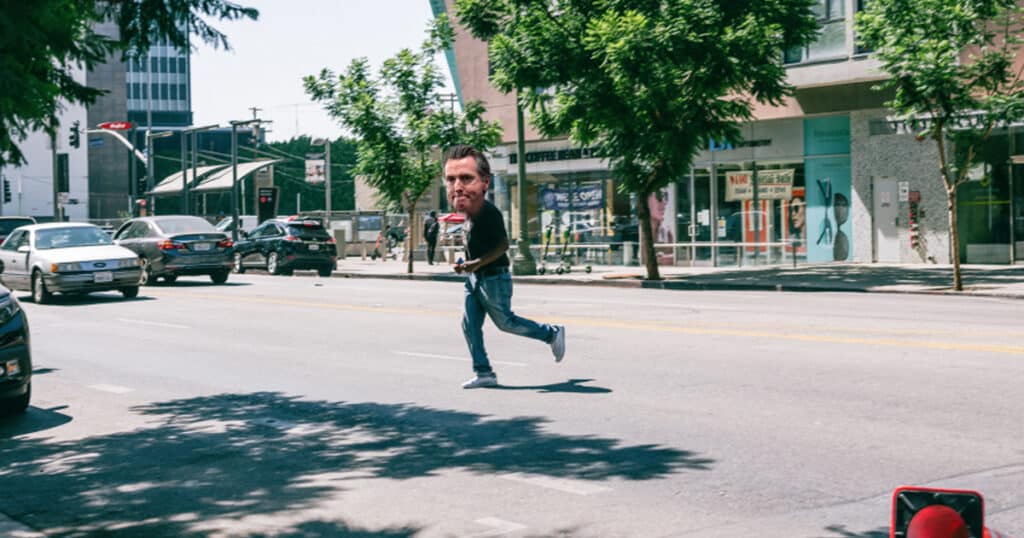
New California Laws Ban Fur Sales, Allow Loitering (for Potential Prostitutes) and Decriminalizes Jaywalking
With its Gov. Gavin Newsom signing nearly one thousand new laws in the 2022 legislative session, California now has the distinction of being the first state in the country to ban the sale and manufacturing of new fur products. New Golden State laws also decriminalize the acts of loitering in a public place with the intent to commit prostitution, and jaywalking — in case you are so focused on meeting a loitering individual you forget to enter a crosswalk.
California’s ban on the sale of fur went into effect January 1.
The fur trade ranks as one of America’s oldest, continuously operating industries, according to a report by the California Globe, and in the united States comprises more than 1,000 fur retailers, 100 manufacturers, more than 200 small family farmers and tens of thousands of trappers, all of whose businesses, jobs and livelihoods depend on the trade.
Furs nationally account for around $531 million in sales — 25 to 30 percent of that alone in California, which has annually generated about $300 million in annual sales and has historically been an important source of employment and tax revenues for the state.
In 2019, state Assemblywoman Laura Friedman (D-Glendale) authored Assembly Bill 44, which Gov. Gavin Newsom eventually signed into law.
“There is no need for fur in the 21st century and no place for it in a sustainable future.” Fur is a “fashion statement and statement of wealth. There is no need for warmth,” explained Friedman, who lives in usually-sunny and warm Southern California.
Of course, across its 164,000 square miles, California has a range of diverse climates, some where do often dip to sub-zero temperatures and people do, in fact, wear fur to keep warm.
“There’s no reason for this bill other than one class of society telling another class of society what they can and cannot wear,” Sen. Brian Jones (R-Santee) said in the Globe report.
“Having tried for over 20 years unsuccessfully to win in the court of public opinion, the very narrow minority who support the Vegan agenda now look to lawmakers to force this agenda on the public,” Keith Kaplan of the Fur Information Council said in the same news story. “It is happening for fur, leather, meat and medical research. Merely giving in to the campaigns of deception, the harassment, intimidations and illegal activities of these animal extremists does not show leadership. Lawmakers must stand up and identify means of addressing animal welfare in meaningful ways while still protecting individual consumer freedom. That is true leadership.”
Friedman is quick to note there are many faux fur products on the market.
“Today there are a variety of humane alternatives, both in terms of faux fur that is virtually indistinguishable from real fur, and alternative textiles that are just as warm or fashionable,” she said, apparently either not realizing or choosing not to acknowledge that faux fur is a petroleum product made of plastic synthetic polymers that are absolutely not biodegradable — points that seem would be of great import in a state that has strongly pushed recycling and pro-environmental policies for years and has all but declared a war on petroleum products, is in the process of drastically reducing diesel vehicles on the road and eliminating the sales of new gas-powered vehicles by 2035.
Two other things that new California laws allowing on its roadways are potential street walkers, also known as prostitutes, and jaywalkers.
Written by state Senator Scott Weiner (D-San Francisco), Senate Bill 357 was signed by Newsom and also became the law of the land, or asphalt, as it were, Jan 1. The law strikes from the code books the crime of loitering in a public place with the intent to commit prostitution.
Wiener decried the previous loitering laws a method of profiling people, including trans woman, trans people of color and women of color.
“You don’t have to do anything,” he said. “Police can arrest someone for how they dress, how high their heels are.”
The loitering decriminalization law is the latest win for sex workers in a series of victories in California.
In 2013, sex workers secured a change in the state fund for victims compensation that made it possible for sex workers who are raped or beaten to receive compensation from that fund.
Another law three years later stopped law enforcement from charging people younger than 18 with prostitution and then, three years after that, Wiener successfully headed a challenge to law enforcement employing used condoms to prove probable cause in prostitution cases.
Meanwhile, the “Freedom to Walk Act” also officially became law at the start of 2023, allowing pedestrians in California to jaywalk without fear of being ticketed — as long as it’s safe.
Assembly Member Phil Ting authored this new law, again citing how under the older state code, those of the state’s communities of color were disproportionately cited for jaywalking compared to the overall population.
For instance, data provided by San Diego Police showed Black people represented 16% of all San Diego jaywalking citations issued between January 2015 and June 2021.
“Everybody has the freedom to walk across the street without being worried about being cited or being stopped,” Ting said.
On the other hand, the California Sheriff’s Association strongly opposed this new legislation, explaining in a statement that “limiting enforcement of California’s laws that are designed to avoid traffic collisions and improve the safety of all who use our roadways will only exacerbate the existing problem.”
Such are examples of the legislative priorities of those on the Left Coast.



